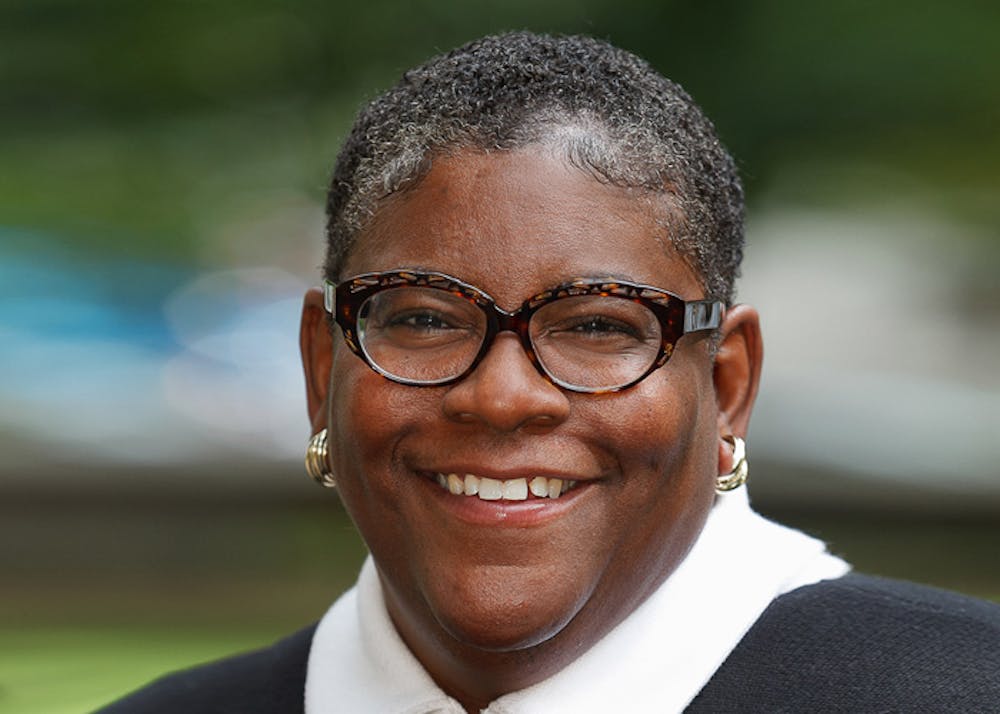Bronté Burleigh-Jones is no stranger to American University.
A double Eagle, Burleigh-Jones assumed the role of chief financial officer, treasurer and vice president Monday when her predecessor, Douglas Kudravetz, stepped down. Her appointment to the position was announced on Aug. 2 in an email to the University community by President Sylvia Burwell.
Once an Eagle, always an Eagle
Burleigh-Jones received her bachelor’s degree in business administration and finance in 1991 and later earned an MBA. During her time as an undergraduate student, Burleigh-Jones was a Fredrick Douglass Scholarship recipient. She said she was not initially interested in the program, however, with her main focus being on academics.
“When I applied to AU, I was admitted early decision, and actually was most interested in getting into American and was delighted to get in early decision,” Burleigh-Jones said. “And it wasn’t until I visited campus for the first time, and I met representatives from the Office of Minority Affairs, who made me aware of the scholarship opportunity.”
The scholarship had a lasting impact for Burleigh-Jones. Among the fellow recipients of the scholarship during her year, six of them pledged to the same historically Black sorority, Delta Sigma Theta. According to Burleigh-Jones, they also continue to support and communicate with one another.
“Many of us have continued those contacts, and the degree to which we continue to reach out to one another to be supportive of one another,” Burleigh-Jones said. “It’s the bonds that we formed and the ways in which we serve. We continue to support one another, many years [later]... we still are very supportive of one another.”
After her time at AU, Burleigh-Jones worked for a variety of organizations in finance-related roles, including the Delta Sigma Theta sorority, the Eneric Petroleum Corporation and the state of Texas.
In 1998, she took over as the assistant dean of financial services at Huston-Tillotson University in Austin, Texas. The university is a historically Black university, which Burleigh-Jones said is particularly meaningful to her.
“I’m a third-generation college student, but all of the other graduates in my family are graduates of historically Black colleges,” Burleigh-Jones said. “So when I made the decision to go to AU, I broke the family mold, and there are members of my family who had very definite feelings about that. So in some ways, I saw going to work for a historically Black college [as] an opportunity to tell and demonstrate to my family that I had not lost track of my roots.”
Advocacy and work beyond D.C.
Burleigh-Jones went on to spend the next nine years working at Huston-Tillotson in a variety of positions, eventually culminating in her taking the position of vice president of finance and administration.
For Burleigh-Jones, her greatest impact at the school was decreasing the student loan default rate. Historically, HBCUs have struggled with this issue, and Huston-Tillotson University was no different.
“Working across the state, we formed a consortium of historically Black colleges and we work collectively to get those default loan default rates down to reasonable levels,” Burleigh-Jones said.
Upon leaving Huston-Tillotson in 2006, Burleigh-Jones took over as the treasurer of St. John's College in Annapolis, Maryland. Upon arriving at St. John’s, Burleigh-Jones said she noticed how few students of color were at the school.
“When I first arrived, I actually was questioned by members of the Black community about why I would go work for an organization that had been viewed in the Black community as not welcoming to people of color,” Burleigh-Jones said.
After seven years at St. John’s College, Burleigh-Jones left the school for the role of vice president of finance and administration at Dickinson College in Pennsylvania.
Returning to her alma mater and planning for the future
According to Burleigh-Jones, one of her major areas of focus has been appealing to and recruiting a more diverse undergraduate population. Appealing to a diverse array of prospective students is more important than ever before, she said, as colleges see fewer white students applying and a greater number of students of color looking at colleges.
“Some of our recruitment and retention strategies may need to be altered in order to be as effective going forward,” Burleigh-Jones said. “And then in terms of how we allocate our resources, we may need to program differently, so we may have to shift our resource allocation.”
At AU, Burleigh-Jones is now responsible for overseeing financial growth as the University recovers from the pandemic. According to Burleigh-Jones, the University has done better than most schools in terms of finance throughout the pandemic, with the University projected to end the year with a net growth in assets.
“AU actually weathered the COVID storm in a much stronger position than most institutions,” Burleigh-Jones said. “So my job will be to help grow resources going forward because it's already operating from a place of strength.”
Looking towards the future, Burleigh-Jones believes that the University is in a strong position to continue meeting operational excellence and building upon the fundraising goals set up in the Change Can’t Wait campaign. The initiative has currently raised $283 million of a $500 million goal.
Burleigh-Jones said that some of the funds will go toward research projects that directly impact the local community surrounding the campus.
The most significant aspect of returning to the University as an executive officer, she said, is the honor of serving the University with both the skills and knowledge she gained as a student and the experiences she has had since leaving.
Correction: A previous version of this article misspelled the Frederick Douglass scholarship program.





